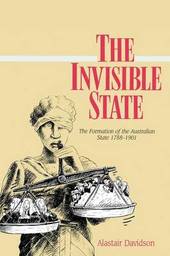
|
The Invisible State: The Formation of the Australian State
Hardback
Main Details
| Title |
The Invisible State: The Formation of the Australian State
|
| Authors and Contributors |
By (author) Alastair Davidson
|
| Series | Studies in Australian History |
|---|
| Physical Properties |
| Format:Hardback | | Pages:350 | | Dimensions(mm): Height 254,Width 178 |
|
| Category/Genre | Australia, New Zealand & Pacific history |
|---|
| ISBN/Barcode |
9780521366588
|
| Classifications | Dewey:342.94029 |
|---|
| Audience | | Professional & Vocational | |
|---|
|
Publishing Details |
| Publisher |
Cambridge University Press
|
| Imprint |
Cambridge University Press
|
| Publication Date |
26 April 1991 |
| Publication Country |
United Kingdom
|
Description
In the modern State, power rests on the consensus of the citizens. They accord its institutions the authority to regulate society. Contemporary state theory suggests that this authority is a right to speak on certain matters in certain ways and to have the audience agree with those statements. It is a matter of an authorised language; all others fall into the category of ratbaggery. In this, the first major book applying contemporary State theory to Australia, Alastair Davidson shows how Australian citizens were formed in the nineteenth century, and how their particular characteristics led to the empowering of a certain language of power: legalism. He further shows that this made the judiciary the most powerful arm of government - unlike countries where the people arm sovereign and the legislature supreme - because the judiciary has the last say on all issues and in its own language.
Reviews"Alastair Davidson uses conceptual tools forged in the thought of Antonio Gramsci and Michel Foucault...to move beyond a more traditional descriptive approach to political history...In a striking conclusion, Davidson argues that the result was and is an Australian state that lacks popular sovereignty and consequently is not a democracy...The wider significance of Davidson's achievement is the way in which he supplies a new dimension to the discussion of fundamental issues such as political development, state formation, sovereignty, and democracy. These are complex and difficult issues; but when history and political science can be brought together to mine generally significant insights from unique cases like the development of the state in Australia, real progress can occur." American Political Science Review
|